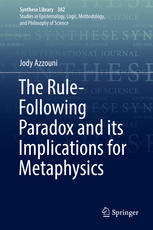

Most ebook files are in PDF format, so you can easily read them using various software such as Foxit Reader or directly on the Google Chrome browser.
Some ebook files are released by publishers in other formats such as .awz, .mobi, .epub, .fb2, etc. You may need to install specific software to read these formats on mobile/PC, such as Calibre.
Please read the tutorial at this link: https://ebookbell.com/faq
We offer FREE conversion to the popular formats you request; however, this may take some time. Therefore, right after payment, please email us, and we will try to provide the service as quickly as possible.
For some exceptional file formats or broken links (if any), please refrain from opening any disputes. Instead, email us first, and we will try to assist within a maximum of 6 hours.
EbookBell Team

4.1
80 reviewsThis monograph presents Azzouni’s new approach to the rule-following paradox. His solution leaves intact an isolated individual’s capacity to follow rules, and it simultaneously avoids replacing the truth conditions for meaning-talk with mere assertability conditions for that talk.
Kripke’s influential version of Wittgenstein’s rule-following paradox—and Wittgenstein’s views more generally—on the contrary, make rule-following practices and assertions about those practices subject to community norms without which they lose their cogency.
Azzouni summarizes and develops Kripke’s original version of Wittgenstein’s rule-following paradox to make salient the linchpin assumptions of the paradox. By doing so, Azzouni reveals how compelling Kripke’s earlier work on the paradox was. Objections raised over the years by Fodor, Forbes Ginsborg, Goldfarb, Tait, Wright, and many others, are all shown to fail. No straight solution (a solution that denies an assumption of the paradox) can be made to work. Azzouni illustrates this in detail by showing that a popular family of straight solutions due to Lewis and refined by Williams, “reference magnetism,” fail as well.
And yet an overlooked sceptical solution is still available in logical space. Azzouni describes a series of “disposition-meaning” private languages that he shows can be successfully used by a population of speakers to communicate with one another despite their ideolectical character. The same sorts of languages enable solitary “Robinson Crusoes” to survive and flourish in their island habitats. These languages—sufficiently refined—have the same properties normal human languages have; and this is the key to solving the rule-following paradox without sacrificing the individual’s authority over her self-imposed rules or her ability to follow those rules.
Azzouni concludes this unusual monograph by uncovering a striking resemblance between the rule-following paradox and Hume’s problem of induction: he shows the rule-following paradox to be a corollary of Hume’s problem that arises when the problem of induction is applied to an individual’s own abilities to follow rules.